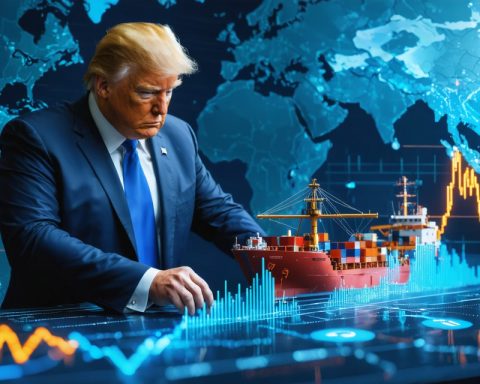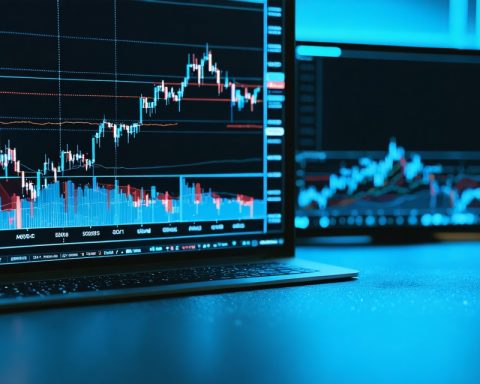- Cryptocurrencies are heavily impacted by global trade disputes and economic uncertainties, leading to market volatility.
- Bitcoin and Ethereum face similar risks as growth stocks, thriving on speculation but vulnerable to economic strain.
- Tariffs and geopolitical tensions have far-reaching effects that ripple through various sectors, including digital currencies.
- The threat of recession raises concerns over the speculative nature of cryptocurrencies, lacking tangible asset stability.
- The role of cryptocurrencies as a hedge against inflation is questioned, especially amid rising interest rates.
- The crypto market faces ongoing uncertainty, with no imminent recovery expected until trade and economic stability return.
- This scenario underscores the interconnectedness of global markets and the vulnerabilities of decentralized assets.
Amid a global economy teetering on uncertainty, the shimmering allure of cryptocurrency has dulled under the looming shadow of trade disputes. Monday’s market upheaval painted a vivid picture of vulnerability, as cryptocurrencies plummeted in value—a descent sparked not only by presidential tariffs but also by gnawing fears over prolonged trade wars.
For years, cryptocurrencies like Bitcoin and Ethereum have been touted as bastions of financial independence, unfettered by the whims of traditional economic forces. Yet, beneath this veneer of autonomy lies an uncanny correlation with growth stocks—both thriving on speculative fervor and crumbling under economic strain. When the market floods with risk, they surge buoyantly; when apprehensions rise, they dissolve into the ether.
As the world rewrites its trade agreements, these digital currencies seem caught in a tempest not of their making. The latest market tumble reflects a stark revelation: tariffs, anchored in the geopolitical tug-of-war, reverberate far beyond immediate trade implications. They trigger ripple effects that cascade across various sectors, cryptocurrencies included.
The loud drumbeat of a potential recession only amplifies these fears. Unlike tangible assets that offer dividends or produce goods, cryptocurrencies remain speculative at their core—volatile amid fiscal unrest. Investors, who once flocked to crypto during the era of pandemic-induced market exuberance, find themselves ensnared in a dilemma. Without the cushion of economic stimulus or robust growth, these digital assets wade into uncharted waters.
As inflation threats linger, the narrative of cryptocurrency as a bulwark against currency devaluation comes into question. Historical patterns remain elusive, as last year has shown cryptocurrencies dwindling alongside rising rates—an indication that boasts of crypto’s immunity to inflation may be unfounded.
Moving forward, the crypto community must brace for uncertainty. The lingering specter of market volatility and the absence of a clear economic resolution suggest that recovery might not be imminent. As such, cautious optimism tempers expectations of an immediate resurgence. Until trade disputes dissipate and economic stability returns, the world of digital currency may well continue its wild ride through turbulent skies.
In essence, the saga of cryptocurrencies weaves a tale of both promise and peril, reminding us that in a world increasingly defined by its interconnections, even the most decentralized of assets are not immune to the tides of global affairs. The lesson here is both humbling and paramount—a reminder of the intricate dance between innovation and geopolitical reality.
Discover the Unseen Forces Steering Cryptocurrency’s Tumultuous Voyage
The Real Impact of Geopolitical Tensions on Cryptocurrencies
The global cryptocurrency market has felt heightened volatility amidst ongoing trade disputes and economic uncertainties, challenging its perceived role as an autonomous financial refuge. Here’s a deeper dive into the factors surrounding this market upheaval and tips for navigating it.
Additional Insights into Cryptocurrency Volatility
1. Interest Rates and Inflation: Historically, rising interest rates have contributed to dips in cryptocurrency prices. The expected correlation between cryptocurrencies as a hedge against inflation and their real-time performance is inconsistent with some recent economic cycles.
2. Evolving Investor Profiles: The demographics of crypto investors are shifting. While early adopters valued decentralization and privacy, newer investors are more motivated by potential gains, which heightens volatility as market conditions change.
3. Environmental Concerns: The environmental impact of cryptocurrency mining is a hot topic. Newer coins and blockchains are exploring more eco-friendly proofs, like Proof of Stake, which could influence future adoption and stability.
4. Regulatory Developments: Countries are increasingly scrutinizing cryptocurrencies, aiming to implement regulations that might either stabilize the market by reducing fraud and speculation or curb innovation if overly restrictive.
Pros and Cons Overview
– Pros: Potential for high returns, innovation in financial technology, decentralized nature.
– Cons: High volatility, environmental impact, regulatory uncertainties, speculative nature.
How-To: Protect Your Investments During Market Turbulence
1. Diversify Holdings: Don’t put all your eggs in one basket. Investing in a variety of assets can mitigate overall risk.
2. Stay Informed: Regularly follow reliable sources for updates on economic policies and crypto regulations.
3. Utilize Stop-Loss Orders: These can help protect against significant losses during market drops.
4. Long-Term Perspective: Cryptocurrency investment should be considered for the long haul rather than short-term gains.
Real-World Use Cases of Cryptocurrencies
– Cross-Border Transfers: Cryptocurrencies enable faster, cheaper international remittances compared to traditional banking systems.
– Security and Privacy: Blockchain offers enhanced security for digital transactions and personal data.
– Smart Contracts: Facilitate automated, trustless agreements between parties without the need for intermediaries, potentially reducing costs and increasing efficiency in various sectors.
Market Forecasts & Industry Trends
– Blockchain Adoption: Despite the current economic climate, blockchain technology continues to see increased adoption across industries such as banking, logistics, and health care.
– Stablecoins: These are gaining traction as a way to combine cryptocurrency’s transactional benefits with stability typically associated with fiat currencies.
– Metaverse Integration: As digital worlds expand, cryptocurrencies are predicted to play a central role in virtual economies.
Actionable Recommendations
– Continuous Learning: Blockchain and cryptocurrency landscapes are rapidly evolving. Engaging in courses or communities can help investors stay ahead.
– Regular Risk Assessment: Periodically review investment strategies in light of changing economic indicators and geopolitical factors.
– Seek Professional Advice: Consult with financial advisors who understand crypto markets to help make informed decisions.
Conclusion
Cryptocurrencies remain an exciting yet challenging space, deeply intertwined with global economic conditions. By staying informed and adaptable, investors can better navigate the turbulent waters of this ever-evolving market.
Keep updated with the latest trends and developments by visiting CoinDesk.












